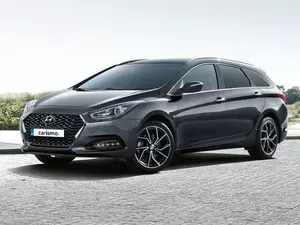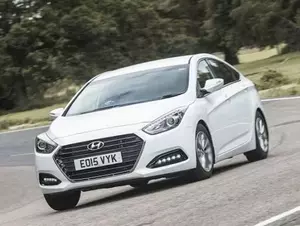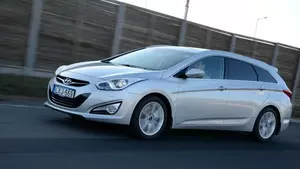
| Vehicle | Curb weight | Difference from world's smallest | Weight to power ratio | 0—60 mph acceleration ratio | Consumption ratio |
|---|---|---|---|---|---|
| 1.6 GDI |
1428 kg / 3149 lbs |
1003 kg (2212 lbs) heavier | 11 kg to 1 hp | 130 kg/s (287 lbs/s) |
213 kg/L (470 lbs/L) |
| 1.6 CRDi |
1539 kg / 3393 lbs |
1114 kg (2456 lbs) heavier | 11 kg to 1 hp | 147 kg/s (324 lbs/s) |
327 kg/L (721 lbs/L) |
| Vehicle | 1.6 GDI |
|---|---|
| Curb weight |
1428 kg / 3149 lbs |
| Difference from world's smallest | 1003 kg (1003 lbs) heavier |
| Weight to power ratio | 11 kg to 1 hp |
| 0—60 mph acceleration ratio | 130 kg/s (287 lbs/s) |
| Consumption ratio |
213 kg/L (470 lbs/L) |
| Vehicle | 1.6 CRDi |
| Curb weight |
1539 kg / 3393 lbs |
| Difference from world's smallest | 1114 kg (1114 lbs) heavier |
| Weight to power ratio | 11 kg to 1 hp |
| 0—60 mph acceleration ratio | 147 kg/s (324 lbs/s) |
| Consumption ratio |
327 kg/L (721 lbs/L) |

| Vehicle | Curb weight | Difference from world's smallest | Weight to power ratio | 0—60 mph acceleration ratio | Consumption ratio |
|---|---|---|---|---|---|
| 1.6 GDI |
1402 kg / 3091 lbs |
977 kg (2154 lbs) heavier | 10 kg to 1 hp | 129 kg/s (284 lbs/s) |
223 kg/L (492 lbs/L) |
| 2.0 GDI |
1468 kg / 3237 lbs |
1043 kg (2300 lbs) heavier | 9 kg to 1 hp | 145 kg/s (320 lbs/s) |
198 kg/L (437 lbs/L) |
| 1.7 CRDI |
1507 kg / 3323 lbs |
1082 kg (2386 lbs) heavier | 11 kg to 1 hp | 154 kg/s (340 lbs/s) |
328 kg/L (723 lbs/L) |
| Vehicle | 1.6 GDI |
|---|---|
| Curb weight |
1402 kg / 3091 lbs |
| Difference from world's smallest | 977 kg (977 lbs) heavier |
| Weight to power ratio | 10 kg to 1 hp |
| 0—60 mph acceleration ratio | 129 kg/s (284 lbs/s) |
| Consumption ratio |
223 kg/L (492 lbs/L) |
| Vehicle | 2.0 GDI |
| Curb weight |
1468 kg / 3237 lbs |
| Difference from world's smallest | 1043 kg (1043 lbs) heavier |
| Weight to power ratio | 9 kg to 1 hp |
| 0—60 mph acceleration ratio | 145 kg/s (320 lbs/s) |
| Consumption ratio |
198 kg/L (437 lbs/L) |
| Vehicle | 1.7 CRDI |
| Curb weight |
1507 kg / 3323 lbs |
| Difference from world's smallest | 1082 kg (1082 lbs) heavier |
| Weight to power ratio | 11 kg to 1 hp |
| 0—60 mph acceleration ratio | 154 kg/s (340 lbs/s) |
| Consumption ratio |
328 kg/L (723 lbs/L) |

| Vehicle | Curb weight | Difference from world's smallest | Weight to power ratio | 0—60 mph acceleration ratio | Consumption ratio |
|---|---|---|---|---|---|
| 2.0 GDI |
1483 kg / 3270 lbs |
1058 kg (2333 lbs) heavier | 9 kg to 1 hp | 144 kg/s (318 lbs/s) |
200 kg/L (441 lbs/L) |
| 1.6 GDI |
1428 kg / 3149 lbs |
1003 kg (2212 lbs) heavier | 11 kg to 1 hp | 130 kg/s (287 lbs/s) |
227 kg/L (501 lbs/L) |
| 1.7 CRDI |
1539 kg / 3393 lbs |
1114 kg (2456 lbs) heavier | 11 kg to 1 hp | 147 kg/s (324 lbs/s) |
314 kg/L (692 lbs/L) |
| Vehicle | 2.0 GDI |
|---|---|
| Curb weight |
1483 kg / 3270 lbs |
| Difference from world's smallest | 1058 kg (1058 lbs) heavier |
| Weight to power ratio | 9 kg to 1 hp |
| 0—60 mph acceleration ratio | 144 kg/s (318 lbs/s) |
| Consumption ratio |
200 kg/L (441 lbs/L) |
| Vehicle | 1.6 GDI |
| Curb weight |
1428 kg / 3149 lbs |
| Difference from world's smallest | 1003 kg (1003 lbs) heavier |
| Weight to power ratio | 11 kg to 1 hp |
| 0—60 mph acceleration ratio | 130 kg/s (287 lbs/s) |
| Consumption ratio |
227 kg/L (501 lbs/L) |
| Vehicle | 1.7 CRDI |
| Curb weight |
1539 kg / 3393 lbs |
| Difference from world's smallest | 1114 kg (1114 lbs) heavier |
| Weight to power ratio | 11 kg to 1 hp |
| 0—60 mph acceleration ratio | 147 kg/s (324 lbs/s) |
| Consumption ratio |
314 kg/L (692 lbs/L) |

| Vehicle | Curb weight | Difference from world's smallest | Weight to power ratio | 0—60 mph acceleration ratio | Consumption ratio |
|---|---|---|---|---|---|
| 2.0 GDI |
1441 kg / 3177 lbs |
1016 kg (2240 lbs) heavier | 8 kg to 1 hp | 140 kg/s (309 lbs/s) |
192 kg/L (423 lbs/L) |
| 2.0 MPI |
1435 kg / 3164 lbs |
1010 kg (2227 lbs) heavier | 9 kg to 1 hp | 137 kg/s (302 lbs/s) | - |
| 1.7 VGT |
1530 kg / 3374 lbs |
1105 kg (2437 lbs) heavier | 11 kg to 1 hp | - | - |
| 1.6 GDI |
1395 kg / 3076 lbs |
970 kg (2139 lbs) heavier | 10 kg to 1 hp | 127 kg/s (280 lbs/s) |
218 kg/L (481 lbs/L) |
| 1.7 CRDi |
1514 kg / 3338 lbs |
1089 kg (2401 lbs) heavier | 11 kg to 1 hp | 133 kg/s (293 lbs/s) |
252 kg/L (556 lbs/L) |
| Vehicle | 2.0 GDI |
|---|---|
| Curb weight |
1441 kg / 3177 lbs |
| Difference from world's smallest | 1016 kg (1016 lbs) heavier |
| Weight to power ratio | 8 kg to 1 hp |
| 0—60 mph acceleration ratio | 140 kg/s (309 lbs/s) |
| Consumption ratio |
192 kg/L (423 lbs/L) |
| Vehicle | 2.0 MPI |
| Curb weight |
1435 kg / 3164 lbs |
| Difference from world's smallest | 1010 kg (1010 lbs) heavier |
| Weight to power ratio | 9 kg to 1 hp |
| 0—60 mph acceleration ratio | 137 kg/s (302 lbs/s) |
| Consumption ratio | - |
| Vehicle | 1.7 VGT |
| Curb weight |
1530 kg / 3374 lbs |
| Difference from world's smallest | 1105 kg (1105 lbs) heavier |
| Weight to power ratio | 11 kg to 1 hp |
| 0—60 mph acceleration ratio | - |
| Consumption ratio | - |
| Vehicle | 1.6 GDI |
| Curb weight |
1395 kg / 3076 lbs |
| Difference from world's smallest | 970 kg (970 lbs) heavier |
| Weight to power ratio | 10 kg to 1 hp |
| 0—60 mph acceleration ratio | 127 kg/s (280 lbs/s) |
| Consumption ratio |
218 kg/L (481 lbs/L) |
| Vehicle | 1.7 CRDi |
| Curb weight |
1514 kg / 3338 lbs |
| Difference from world's smallest | 1089 kg (1089 lbs) heavier |
| Weight to power ratio | 11 kg to 1 hp |
| 0—60 mph acceleration ratio | 133 kg/s (293 lbs/s) |
| Consumption ratio |
252 kg/L (556 lbs/L) |

| Vehicle | Curb weight | Difference from world's smallest | Weight to power ratio | 0—60 mph acceleration ratio | Consumption ratio |
|---|---|---|---|---|---|
| 2.0 GDI |
1441 kg / 3177 lbs |
1016 kg (2240 lbs) heavier | 8 kg to 1 hp | 152 kg/s (335 lbs/s) |
192 kg/L (423 lbs/L) |
| 1.7 CRDi |
1514 kg / 3338 lbs |
1089 kg (2401 lbs) heavier | 11 kg to 1 hp | 138 kg/s (304 lbs/s) |
252 kg/L (556 lbs/L) |
| 1.6 GDI |
1395 kg / 3076 lbs |
970 kg (2139 lbs) heavier | 10 kg to 1 hp | 130 kg/s (287 lbs/s) |
218 kg/L (481 lbs/L) |
| Vehicle | 2.0 GDI |
|---|---|
| Curb weight |
1441 kg / 3177 lbs |
| Difference from world's smallest | 1016 kg (1016 lbs) heavier |
| Weight to power ratio | 8 kg to 1 hp |
| 0—60 mph acceleration ratio | 152 kg/s (335 lbs/s) |
| Consumption ratio |
192 kg/L (423 lbs/L) |
| Vehicle | 1.7 CRDi |
| Curb weight |
1514 kg / 3338 lbs |
| Difference from world's smallest | 1089 kg (1089 lbs) heavier |
| Weight to power ratio | 11 kg to 1 hp |
| 0—60 mph acceleration ratio | 138 kg/s (304 lbs/s) |
| Consumption ratio |
252 kg/L (556 lbs/L) |
| Vehicle | 1.6 GDI |
| Curb weight |
1395 kg / 3076 lbs |
| Difference from world's smallest | 970 kg (970 lbs) heavier |
| Weight to power ratio | 10 kg to 1 hp |
| 0—60 mph acceleration ratio | 130 kg/s (287 lbs/s) |
| Consumption ratio |
218 kg/L (481 lbs/L) |